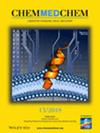已获批准的 HIF 脯氨酰羟化酶抑制剂 Desidustat 和 Enarodustat 的晶体学和选择性研究
IF 3.6
4区 医学
Q2 CHEMISTRY, MEDICINAL
引用次数: 0
摘要
含脯氨酰羟化酶结构域的蛋白 1-3(PHD1-3)是依赖于 2-氧代戊二酸(2OG)的氧合酶,可催化异源二聚体转录因子缺氧诱导因子(HIF)α 亚基中脯氨酰残基的 C-4 羟基化,这种修饰可促进 HIF-α 通过泛素-蛋白酶体途径降解。药理抑制 PHD 可诱导 HIF-α 稳定,从而促进 HIF 靶基因的转录。PHD 抑制剂能刺激促红细胞生成素(EPO)的产生,因此被用于治疗慢性肾病(CKD)引起的贫血症。我们报告了已获批准的 PHD 抑制剂 Desidustat 和 Enarodustat 以及临床候选药物 TP0463518 对一组有代表性的分离重组人 2OG 加氧酶活性的影响。这三种分子对 PHD 的抑制作用比对其他 2OG 加氧酶的抑制作用更具选择性。我们获得了德司达和依纳洛司达与人 2OG 加氧酶抑制低氧诱导因子-α(FIH)因子复合物的晶体结构,结合模型研究,这些结构说明了德司达和依纳洛司达与包括 PHD1-3 在内的 2OG 加氧酶活性位点铁(II)的结合模式。这些结果将有助于设计 PHDs 和其他 2OG 加氧酶的选择性抑制剂,由于这些酶参与新陈代谢调节、表观遗传信号、DNA 损伤修复和农用化学品抗性等,因此具有药用价值。本文章由计算机程序翻译,如有差异,请以英文原文为准。
Crystallographic and Selectivity Studies on the Approved HIF Prolyl Hydroxylase Inhibitors Desidustat and Enarodustat
Prolyl hydroxylase domain‐containing proteins 1‐3 (PHD1‐3) are 2‐oxoglutarate (2OG)‐dependent oxygenases catalysing C‐4 hydroxylation of prolyl residues in α‐subunits of the heterodimeric transcription factor hypoxia‐inducible factor (HIF), modifications that promote HIF‐α degradation via the ubiquitin‐proteasome pathway. Pharmacological inhibition of the PHDs induces HIF‐α stabilisation, so promoting HIF target gene transcription. PHD inhibitors are used to treat anaemia caused by chronic kidney disease (CKD) due to their ability to stimulate erythropoietin (EPO) production. We report studies on the effects of the approved PHD inhibitors Desidustat and Enarodustat, and the clinical candidate TP0463518, on activities of a representative set of isolated recombinant human 2OG oxygenases. The three molecules manifest selectivity for PHD inhibition over that of the other 2OG oxygenases evaluated. We obtained crystal structures of Desidustat and Enarodustat in complex with the human 2OG oxygenase factor inhibiting hypoxia‐inducible factor‐α (FIH), which, together with modelling studies, inform on the binding modes of Desidustat and Enarodustat to active site Fe(II) in 2OG oxygenases, including PHD1‐3. The results will help in the design of selective inhibitors of both the PHDs and other 2OG oxygenases, which are of medicinal interest due to their involvement inter alia in metabolic regulation, epigenetic signalling, DNA‐damage repair, and agrochemical resistance.
求助全文
通过发布文献求助,成功后即可免费获取论文全文。
去求助
来源期刊

ChemMedChem
医学-药学
CiteScore
6.70
自引率
2.90%
发文量
280
审稿时长
1 months
期刊介绍:
Quality research. Outstanding publications. With an impact factor of 3.124 (2019), ChemMedChem is a top journal for research at the interface of chemistry, biology and medicine. It is published on behalf of Chemistry Europe, an association of 16 European chemical societies.
ChemMedChem publishes primary as well as critical secondary and tertiary information from authors across and for the world. Its mission is to integrate the wide and flourishing field of medicinal and pharmaceutical sciences, ranging from drug design and discovery to drug development and delivery, from molecular modeling to combinatorial chemistry, from target validation to lead generation and ADMET studies. ChemMedChem typically covers topics on small molecules, therapeutic macromolecules, peptides, peptidomimetics, and aptamers, protein-drug conjugates, nucleic acid therapies, and beginning 2017, nanomedicine, particularly 1) targeted nanodelivery, 2) theranostic nanoparticles, and 3) nanodrugs.
Contents
ChemMedChem publishes an attractive mixture of:
Full Papers and Communications
Reviews and Minireviews
Patent Reviews
Highlights and Concepts
Book and Multimedia Reviews.
 求助内容:
求助内容: 应助结果提醒方式:
应助结果提醒方式:


